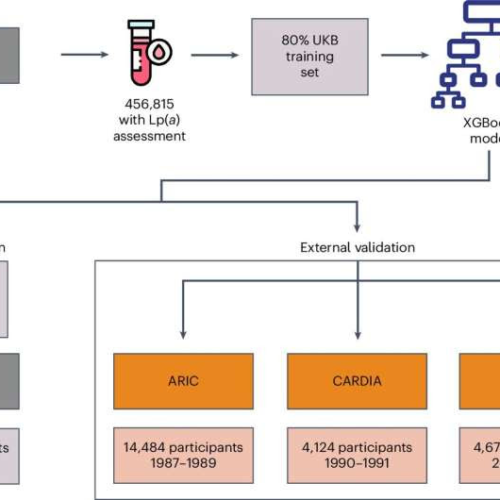JULY 25, 2024 by Jeff Hansen, University of Alabama at Birmingham Graphical abstract. Credit: iScience (2024). DOI: 10.1016/j.isci.2024.110395Millions of adults have atrial fibrillation—an irregular beating of the upper chambers of the heart that yields increased risk of heart failure, stroke and death. Many genetic mutations in the developing fetus can lead to adult atrial fibrillation,...
Tag: <span>cardiology</span>
Blood pressure high for years? Beware of stroke risk
NEWS RELEASE 23-JUL-2024 The study stressed the importance early diagnosis and sustained control of high blood pressure for Black and Hispanic patients, who have a higher risk of stroke Peer-Reviewed PublicationMICHIGAN MEDICINE – UNIVERSITY OF MICHIGAN High blood pressure is known to increase a person’s chances of having a stroke. But a study led by...
Preeclampsia’s lingering shadow
JULY 11, 2024 by Caitlin Doran, Mayo Clinic News Network Credit: Unsplash/CC0 Public DomainA study published in the journal Hypertension points to the potential long-term consequences of preeclampsia — specifically, accelerated aging in women who have had this condition. Preeclampsia is a pregnancy complication marked by high blood pressure, which can affect health outcomes for...
Pulsed field ablation procedures found safe and effective for atrial fibrillation patients
NEWS RELEASE 8-JUL-2024 Peer-Reviewed PublicationTHE MOUNT SINAI HOSPITAL / MOUNT SINAI SCHOOL OF MEDICINE IMAGE: DR. VIVEK REDDY LED THE LARGEST STUDY OF ITS KIND THAT SHOWS PULSED FIELD ABLATION IS SAFE FOR TREATING PATIENTS WITH COMMON TYPES OF ATRIAL FIBRILLATION. CREDIT: MOUNT SINAI HEALTH SYSTEM Pulsed field ablation (PFA) is safe for treating patients...
Experts discuss new screening tool developed for lipoprotein(a) detection
JULY 3, 2024 by Rachel Martin, Yale University Study design. We developed and validated a machine learning model using structured clinical elements to optimize screening for elevated Lp(a), which can be deployed in clinical settings for case identification. Credit: Nature Cardiovascular Research (2024). DOI: 10.1038/s44161-024-00469-1Many patients receive a standardized lipid panel as part of a...
New, simple test detects rare fatal genetic heart condition
NEWS RELEASE 20-JUN-2024 Peer-Reviewed PublicationMCMASTER UNIVERSITY A team of international researchers has revealed a new, simple clinical test to detect Calcium Release Deficiency Syndrome (CRDS), a life-threatening genetic arrhythmia that causes dangerously fast heartbeats and can lead to severe complications such as sudden cardiac arrest and death. The new diagnostic method monitors for changes in...
Is it time to stop recommending strict salt restriction in people with heart failure? – cardiology
by Wiley Credit: CC0 Public Domain For decades, it’s been thought that people with heart failure should drastically reduce their dietary salt intake, but some studies have suggested that salt restriction could be harmful for these patients. A recent review in the European Journal of Clinical Investigation that assessed all relevant studies published between 2000...
Sorting therapeutic stem cells by function improves healing after heart attack, lab study shows -cardiology
by Wayne Lewis, University of California, Los Angeles Nanovials containing individual cells (green) and secreted extracellular vesicles (magenta) within their cavities. Credit: Doyeon Koo/UCLASelecting specific cells to be used in an investigational therapy has led to improved recovery of heart function in a new study employing a lab model for myocardial infarction, the medical term...
Can losing your sense of smell predict heart failure?
JUNE 10, 2024 by Laura Williamson, American Heart Association Credit: Pixabay/CC0 Public DomainLosing the ability to smell properly—a common sensory deficit as people age—may help predict or even contribute to the development of heart failure, new research suggests. The study, published in the Journal of the American Heart Association, adds to a growing body of...
Heat exposure increases myocardial blood flow: Study
JUNE 11, 2024 by Elana Gotkine Myocardial blood flow (MBF) increases about twofold with exposure that increases the core temperature by 1.5 degrees Celsius, according to a study published online June 11 in the Annals of Internal Medicine. Hadiatou Barry, from the Université de Montréal, and colleagues quantified the MBF requirements of heat exposure in...






